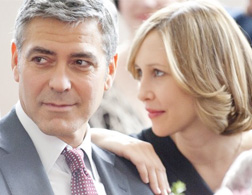Up in the Air
George Clooney examines his soul at 30,000 feet.
After you've seen Up in the Air, check back in here and listen to our Spoiler Special discussion:
You can also click hereto download the MP3 file, or you'll find this and dozens of other Spoiler Specials in our iTunes podcast feed here.
Less than 48 hours after seeing Up in the Air (Paramount Pictures), I've mentally downgraded it from sparkling to smug. Jason Reitman's third film has the lifespan of a state-fair churro: tasty at the point of consumption, it congeals soon afterward into its component ingredients of sugar and lard. If you're watching carefully, this disillusioning process happens during the movie, but the power of George Clooney's personality is such that it's tough to pinpoint the moment of decline. Clooney is one of our great natural resources, but his power must be carefully husbanded lest it destroy us all. Fantastic Mr. Fox deployed the Cloonforce with finesse. But in Up in the Air, the actor's charm is used like caulking, to plaster over plot holes and disguise the conventionality of the story beneath.
That paragraph came off as so much meaner toward this movie than I actually feel. Like Reitman's Juno, Up in the Air is full of clever one-liners, winning performances, and wistful indie music. It's impossible not to like it, which is precisely what's so annoying about it. This is the kind of film that will hoover up every award in sight through sheer inoffensiveness. As of this writing, it's already garnered the best-picture, best-actor, best-supporting-actress, and best-adapted-screenplay prizes from the mysterious entity known as the National Board of Review. If Up in the Air weren't gliding inexorably into an awards season of near-guaranteed over-recognition, it would be free to just be what it is: a frothy little romantic comedy with a couple of solemn nods to the recession economy and a scorching-hot leading couple.
Clooney plays Ryan Bingham, a professional downsizer who flies around the country firing people from their jobs. Ryan spends 322 days a year in airports, rental cars, and chain hotels—and loves it. He's a rootless soul who's more at home in transit than in his own apartment, a featureless white box in Omaha, Neb. Ryan travels light, both literally and figuratively; he's unmarried, semi-estranged from his family, and his dearest dream is to reach the 10-million-mile mark on his frequent-flyer account. During a layover, he hooks up with a woman who can match him platinum card for platinum card: the hypercompetent, self-assured Alex (Vera Farmiga), who assures Ryan she's equally averse to commitment. ("Imagine me as you, but with a vagina.")
Ryan's officious boss, Craig (Jason Bateman), wants to switch the company over to a Skype-based firing system to save on travel expenses, so he hires a fresh-out-of-college whiz kid, Natalie (Anna Kendrick), and sends her out on the road with Ryan to learn the ropes of "career transition counseling." The generational contrast between Ryan and Natalie is nicely drawn: She's idealistic when it comes to love but perfectly fine with firing people remotely by computer. Ryan, on the other hand, is mistrustful of all human relationships but a firm believer in the personal touch when it comes to job termination. After a wild all-night party on a corporate yacht, Ryan decides to make Alex his date for his sister's wedding in Wisconsin. Their relationship threatens to get deep. (A development signified by the presence of Elliott Smith's "Angel in the Snow" on the soundtrack. Like a lot of the pop songs Reitman chooses, it's beautiful but distracting. At least in Juno, the indie soundtrack was composed of songs the characters might conceivably have listened to. It's unlikely that Clooney's middle-aged corporate warrior would groove to college radio.)
Farmiga and Clooney have an old-time screwball chemistry, bracingly transposed to a modern setting. If you can imagine Cary Grant and Barbara Stanwyck sexting, you're pretty much there. The early scenes they have together could not be snappier, better-paced, or more smoldering, which is why it's so disappointing when later plot developments plonk the couple into prosaic, contemporary rom-comville—the land where people have sudden epiphanies and run through crowded airports. Reitman has a gift for mildly satiric populist entertainments, but why does he have to set his sights so low? The Walter Kirn novel that inspired this film was a scathing satire of corporate happyspeak and late-capitalist alienation. Reitman is entitled to soften it up for his purposes, but in his hands Ryan's story takes on a redemptive, quasi-humanist glow that seems untrue not only to the source material but to the character himself.
Up in the Air begins and ends with montages of people speaking into the camera about the ego-shattering experience of being laid off. These people are played by real-life victims of the recession: Reitman put out a casting call in several U.S. cities to gather their testimony, and their stories, even out of context, are moving. But there's something instrumentalizing about the way these interviews are shoehorned in for dramatic effect, especially when Reitman seamlessly cuts from the faces of out-of-work Americans to the familiar comic mugs of J.K. Simmons or Zach Galifianakis, playing out-of-work fictional characters. But it's not too late for Reitman to make it up to those whose misery served as a backdrop for what seems likely to be his most successful film to date. He can thank them in his Oscar speech.
Slate V: The critics on Up in the Air and other new releases

